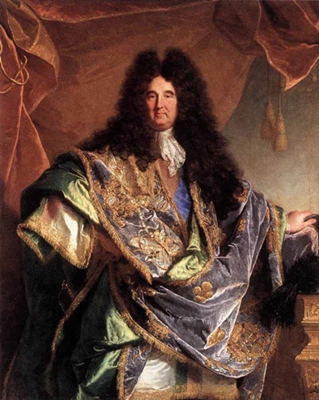Dangeau’s Diary, April 1690

8th — Monsieur de Louvois, having discovered that some of the clerks in his office had received money for commissions, has dismissed them in disgrace and has imprisoned a female, who was the agent in the business, hoping by her means to make greater discoveries.
10th — The King has ordered Monsieur Hervé, senior member of the parliament, to resign his place, as he availed himself of his privilege to avoid paying his creditors.
14th — The King has presented Madame la Princesse d’Harcourt with a thousand pistoles. That money will repair the loss she suffered six weeks ago by the fire at Compiègne.
19th — The Dauphine, who had been somewhat relieved during the day, found herself so ill at night, that she requested extreme unction might be administered to her, which she received very devoutly, being in the full possession of her reason. The King, Monseigneur, and all the royal family, were present at this mournful spectacle at three o’clock in the morning. The bishop of Meaux performed mass in her room and administered the sacrament to her. Her mind is still as tranquil as it was previously to her illness.
20th — The Dauphine, finding herself at the point of death and having received all the sacraments, spoke to the King and Monseigneur in private; and sent for Madame de Maintenon, who had gone to Saint-Cyr. She then desired to see her children and gave them her blessing: she said to the Duc de Berry, as she embraced him, “It is with sincerity, although you cost me very dear.” She passed the afternoon in a composed state and thought of nothing but her salvation. The preseriptions of a medical man, who had cured many persons of her acquaintance, were proposed to her, but she made no reply; at seven o’clock, convulsions commenced; her death was perceived to be fast approaching. The King, Monseigneur, and all the royal family, again entered her room; her agony lasted till half past seven; she retained her senses to the last; she did not lose them for a moment after she received extreme unction yesterday. After her death, the King took Monseigneur to his apartments and said to him “You see what is the end of all the grandeur of the world; the same awaits you and me.” About nine o’clock, the King, Monseigneur and Madame went to Marly, where Monseigneur has chosen a small room upon the upper story in order to be more retired. The Dauphine is to be taken from the small bed in which she died and to be placed in her state-bed, and the tire-woman will put on her chemise.
21st — The King has ordered that the same honours shall be paid to the Dauphine as to the late Queen: his Majesty does not go into mourning, because she was his daughter-in-law and fathers do not go into mourning for their children. She was related to him many ways; but the relationship of daughter effaces all others. As the King does not wear mourning, the foreign princes and the officers of the court will not put on black; none but the Princes of the Blood and the servants. The ladies have commenced watching the body of the Dauphine this morning at nine o’clock, and they relieve each other every hour; there are four with he ; there are also continually round the body, the almoners, the fathers of the mission, the Récollets of Versailles and the Feuillants of Paris, who have the privilege of being present; the clergy are on the right-hand side of the bed; two altars have been raised in the room in which mass is commenced at day-break. About seven o’clock in the evening, twenty-four hours after her death, the body was opened: the lady of honour and the tire-woman were present: there were no men present but the physicians and the surgeons; not even the page of honour. The King has appointed the bishops of Mirepoix and Nismes to pronounce the funeral sermon, one at Saint-Denis and the other at Notre-Dame.
22d — The Dauphine has made a kind of will, partly written by the hand of Mademoiselle de Bessola and partly by that of her confessor, in which she begs the King will allow her to dispose of some jewels and money in her casket. She says that she gives nothing to the King, because all belongs to him and that she does not think she has any thing worthy to be offered to him. She gives a large diamond, which she always wore, to Monseigneur; a ring to Madame, which she begs her to wear in memory of her; a beautiful cross to Madame de Guise; a ring to the Elector, her brother; another to Prince Clement; one to her sister, the Grand-Princess of Tuscany, a present she had intended for her four months past, and which she had no opportunity of sending her. As to her money, amounting to two thousand five hundred pistoles, she disposes of it as follows: six hundred to Mademoiselle Patrocle, one of her waiting-women; six hundred to Vandrevec, her cloak bearer; three hundred to a girl who waits upon Mademoiselle Bessola, and whom she had brought with her from Germany; the remainder she leaves to be distributed in charity. She orders many masses; she begs the King to give a pension of two hundred francs to her confessor, that he may have a room with a fire in it at the Jesuits. She had entreated the King before she died to take care of Mademoiselle Bessola, to whom she bequeaths her prie-dieu and her bureau; she leaves the remainder of her jewels to her children.
28th — The marriage of Mademoiselle d’Humières with Monsieur de Chappes is put off. Monsieur d’Aumont is desirous that his son, upon marrying and taking the name of d’Humières, should have the duchy and the marshal will not resign it so soon. The King said at Marly, that he was sorry he had not made his arrangements in order to join the army this year, that he finds it irksome to remain with the Cardinals and the members of the council and that next year he will certainly go. His Majesty took an airing to Saint-Cloud with Monseigneur and Monsieur.
29th — There were so many disputes about the removal of the Queen’s body to Saint- Denis, that, to avoid a repetition of them, the master of the ceremonies has gone to Marly to receive the King’s commands. The pall, which is over the body of the Dauphine, is the pall belonging to the crown; it must be changed for another, the outside of which must be of black velvet.




One Comment
Tess
“Fathers do not go into mourning for their children…” What a merciless custom/rule… :/